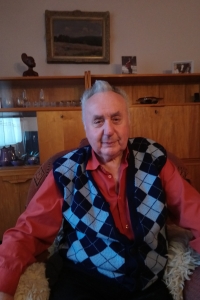The nonsense introduced by the Communists is all gone
Antonín Zakopal was born on July 27, 1931 in Prostějov. However, he grew up in Holešov, where his father Antonín held the position of a director of a credit union until 1948. Little Antonín became a scout and from 1945 he also led his club. He graduated from the Holešov secondary grammar school in 1950, and in the end he managed to complete veterinary medicine at the University of Veterinary Medicine in Brno, despite the poor staff profile in 1955. He spent three years of practice in the border town Bor near Tachov. In Zlín (back then Gottwaldov), where he then settled, he worked until 1970, first as a regional, later a district veterinarian. He built a house in Malenovice, got married and raised three children. In the period of the beginning of normalization, he was degraded at work due to his views and spent many years in the Zlín slaughterhouse as a veterinary inspector until his retirement. During the Velvet Revolution, he participated in Zlín meetings, but did not actively enter politics. For the last ten years he has lived in Holešov, where he got married for the second time to Dagmar Zakopalová.
